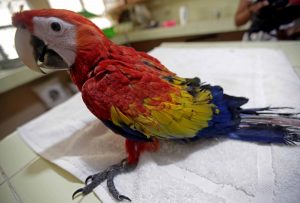Managua, Sep 16 (efe-epa).- Nicaragua’s National Zoo has welcomed a baby scarlet macaw, a species in danger of extinction, born in captivity at the zoo for the first time, zoo authorities reported Monday.
“This is the first time that we’ve incubated an egg,” the director of the Wild Animals Reproduction Center at the Nicaragua Zoo, Eduardo Sacasa, told EFE.
 The baby scarlet macaw, named by zoo employees “Milagros” (Miracles), weighed 0.023 kg (about 0.8 ounces) when it emerged from its egg on June 10, and since then it has been gaining weight, now tipping the scales at 1.1 kg (about 2.4 lbs.), and is in excellent health, Sacasa said.
The baby scarlet macaw, named by zoo employees “Milagros” (Miracles), weighed 0.023 kg (about 0.8 ounces) when it emerged from its egg on June 10, and since then it has been gaining weight, now tipping the scales at 1.1 kg (about 2.4 lbs.), and is in excellent health, Sacasa said.
The scarlet macaw is a large red, yellow, and blue Central and South American parrot.
The new addition to the zoo gives hope regarding the reintroduction of this species, almost extinct in the tropical forests of the Indio Maiz biological preserve, in far southeastern Nicaragua, which spans 2,600 square kilometers (about 1,000 square miles) and borders on Costa Rica.
“It’s not for sale, it’s not a business, but rather it’s about preserving our animals, which is our mission,” said Sacasa, whose Center has saved and released thousands of individuals from various species after rehabilitating them over the past 10 years.
Milagros, the only survivor from among three eggs, is shy and still cannot perch on a branch, and thus she spends most of her time in a wooden box.
When “the conditions are right,” that is, when she’s in a safe habitat, Milagros will be released because since she was born in captivity she would be easily captured by traffickers in exotic animals, Sacasa said.
The scarlet macaw has at least five caretakers who feed her every two hours.
If Milagros grows up to be a healthy adult, she could attain a length of 90 cm (29.5 inches) and live for up to 70 years in captivity, or 45 if she is released into the natural environment, according to Sacasa.
According to a recent study by the Young Environmentalists Club, the scarlet macaw is one of eight avian species in Nicaragua that is in danger of extinction, given that their populations are decreasing due to illegal animal trafficking and habitat loss.
